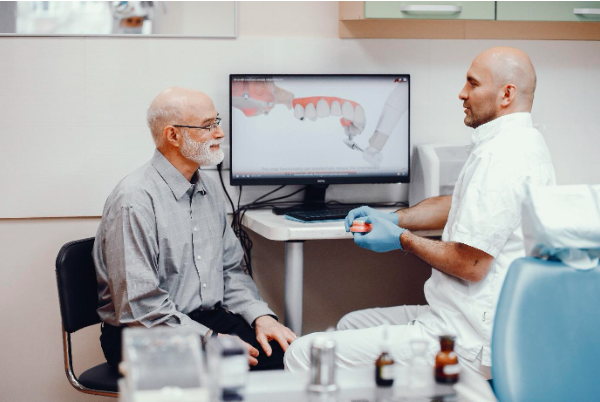Dentures vs Implants: Choose the Right One for You

Many people face common dental issues like gum disease, tooth decay, and trauma, all of which can lead to tooth loss if not treated. Tooth loss can also happen due to cracked teeth, teeth grinding (bruxism), or teeth that never develop properly. Losing teeth doesn’t just change your smile—it can cause other oral health problems. Without a tooth in place, nearby teeth may shift, leading to an uneven bite. Tooth loss can also result in bone loss in your jaw, causing discomfort and even changes to the shape of your face.
If left untreated, tooth loss can cause complications such as shifting teeth, jaw pain, or speech difficulties. Over time, it may lead to more teeth falling out, affecting your appearance and ability to eat or speak properly.
Dentures and dental implants are two common solutions that can address these issues and prevent further complications.In this blog, we will discuss when to choose dentures versus implants, how they can work with teeth aligners, their costs, and other important factors to help you make the best choice for your oral health.
Who Needs Dentures?
Dentures are removable dental devices designed to replace missing teeth in the upper or lower jaw, significantly enhancing oral function and aesthetics.3 There are two main types: full dentures, which replace all teeth in either the upper or lower jaw, and partial dentures, which fill in gaps left by a few missing teeth.
Partial dentures are particularly useful for individuals who have lost several teeth but still retain some natural ones. They are secured with metal clasps that attach to the remaining teeth, providing stability and support. This type of denture helps maintain the alignment of natural teeth, preventing shifting and further tooth loss.
Dentures are particularly suited for individuals who have lost most or all of their teeth due to gum disease, tooth decay, or injury. Custom-made to fit your mouth, they can also enhance your appearance by restoring your smile and filling in gaps.
Dentures offer several benefits, especially for those who can’t get dental implants. They are generally more affordable and don’t require surgery. However, there are some downsides. Dentures can feel uncomfortable and may slip while eating or talking. They also don’t prevent jawbone loss, which can change your facial structure over time.
For those looking for a non-invasive and faster solution, dentures are a practical and cost-effective alternative to implants.
Read also: Understanding the Legal Implications of Health Sharing Plans for Small Businesses
When Are Implants Useful?
Dental implants are small, threaded posts that replace missing tooth roots. Made from materials like titanium or ceramic, they are surgically placed in the jawbone. After healing, an artificial tooth, such as a crown or bridge, is attached to the implant, allowing it to function like a natural tooth.2,5
Dental implants are a great choice for replacing missing teeth and are helpful in several situations. Implants are typically used when replacing a single tooth or multiple teeth, especially when you need a long-term solution. Implants are a good choice when a tooth is missing at the end of your jaws as there’s less support for a denture. For completely missing teeth also, implants can be placed to support the dentures, enhancing their stability and function.
Implants are ideal for patients with healthy gums and sufficient jawbone to support them and they have several benefits compared to dentures. They offer better stability by being securely anchored in the jawbone, which improves chewing and biting. Implants also help maintain jawbone health, preventing deterioration that can occur after tooth loss. Unlike dentures, which may require altering surrounding teeth, implants preserve natural tooth structure.
While implants can be expensive and involve some surgical risks, their long-lasting benefits, such as durability and stability, make them an excellent option for anyone needing to replace missing teeth.
Your dentist can help determine which is the best option for you depending on factors such as the condition of your remaining teeth, bone structure, and personal preferences.
Using Dentures/Implants with Teeth Aligners
Clear aligners are nearly invisible plastic trays designed to straighten teeth discreetly. They apply gentle pressure to gradually reposition teeth over time. Clear aligners can effectively treat mild to moderate orthodontic issues, such as gapped or crowded teeth, overbites, and crossbites.
When considering aligners with dentures, it’s important to note that individuals with a partial denture must remove it during treatment. Once aligner treatment is complete, a new denture may be necessary for a proper fit, as the natural teeth will have shifted. If the missing teeth are in different areas, aligners might help close those gaps, potentially reducing the need for a denture.
Aligners can also be utilised if you already have a dental implant. If you have an implant, the aligners can adjust the surrounding natural teeth, without hampering the treatment. However, when planning for a new implant, it’s often best to finish orthodontic treatment first, especially if you need to create space for the implant.
The teeth aligners cost can vary widely depending on the complexity of the treatment and the provider. On average, the cost of aligners in India typically ranges from ₹80,000 to ₹1,20,000, depending on the extent of alignment required.
For personalised advice and the best results, it’s important to talk to a dental professional who can help create a treatment plan that fits your needs.
Conclusion
Choosing between dentures and dental implants really depends on what works best for you. Dentures are a more affordable and non-invasive option, while implants offer a sturdy and natural-looking solution. Additionally, if you’re considering teeth aligners, your dentist or orthodontist will help guide you on how to use them effectively with dentures or implants.




